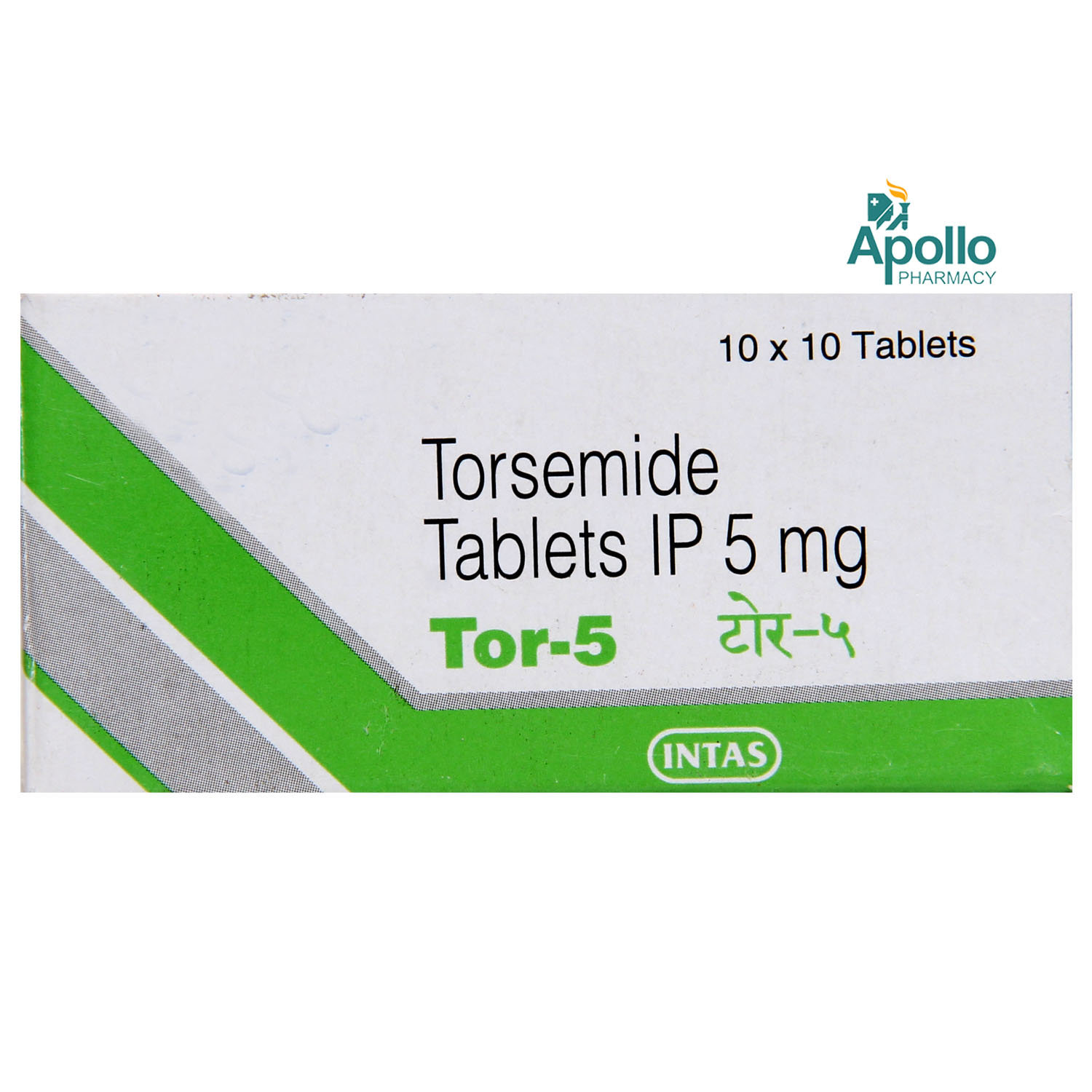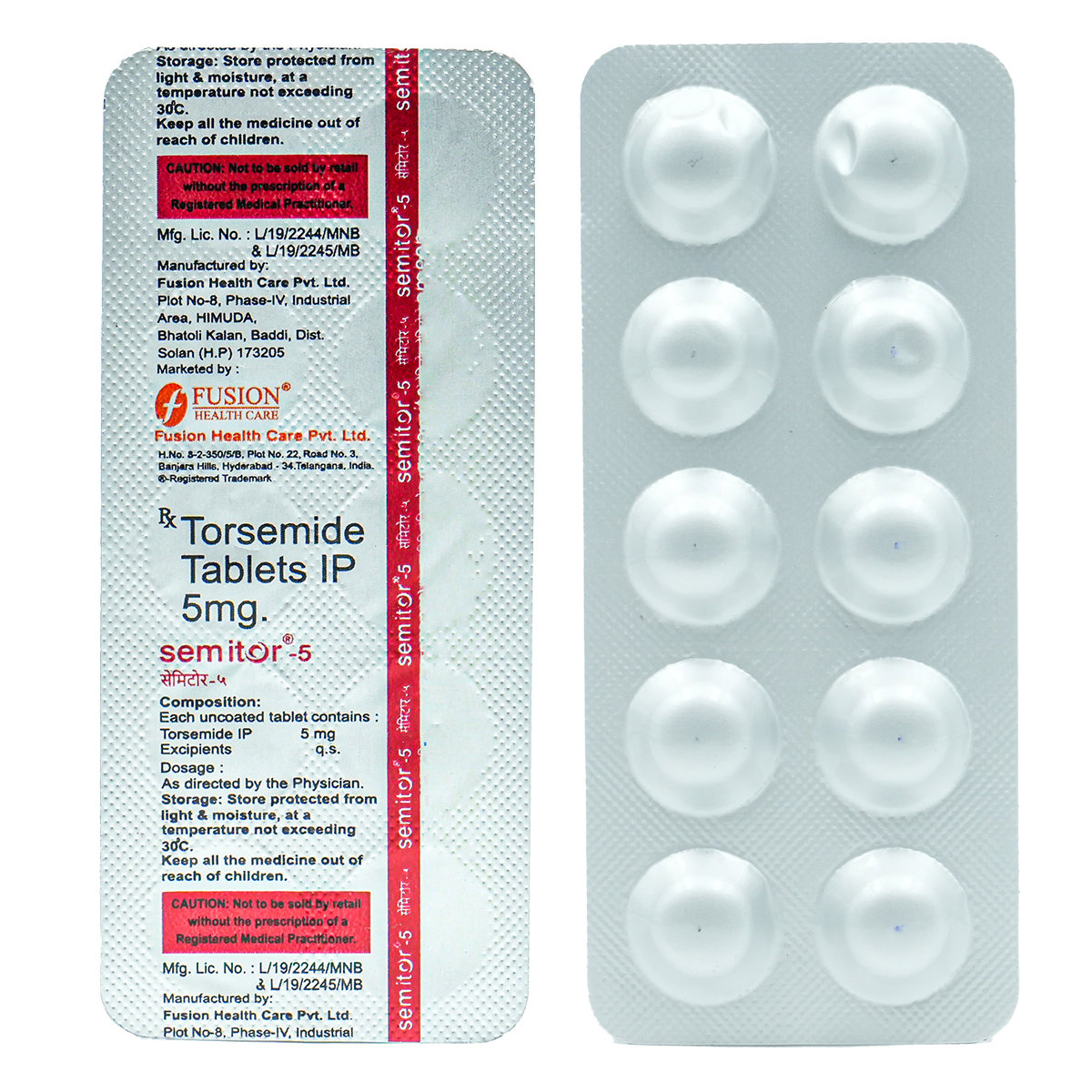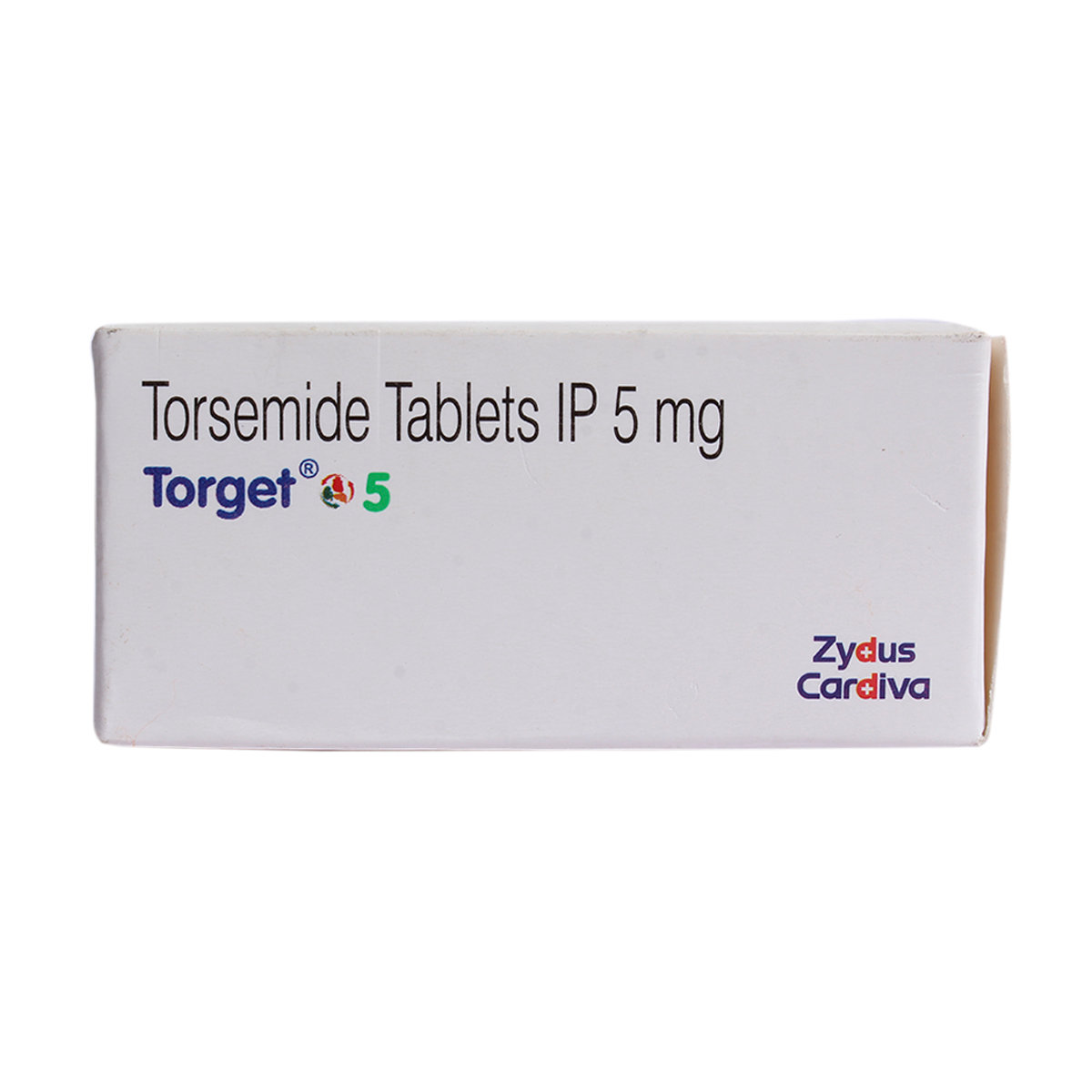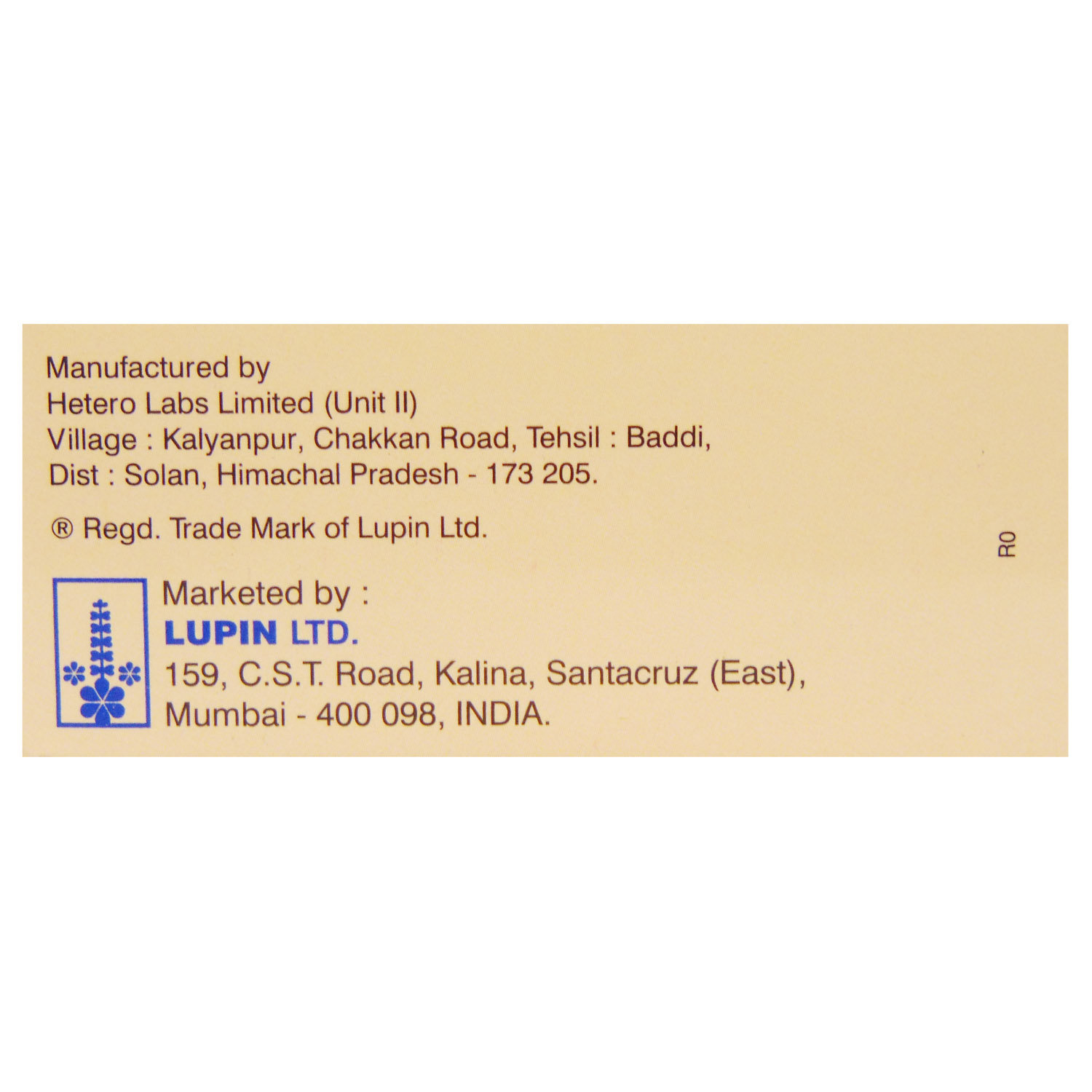Torzi-5 Tablet 10's


MRP ₹39
(Inclusive of all Taxes)
₹5.8 Cashback (15%)
Provide Delivery Location
Online payment accepted
 Prescription drug
Prescription drugWhats That
Composition :
Manufacturer/Marketer :
Consume Type :
Return Policy :
About Torzi-5 Tablet 10's
Torzi-5 Tablet 10's belongs to a group of medicines called diuretics (which increase urine production) and is primarily used to treat high blood pressure, heart failure, and oedema (a build-up of fluid in the body). Hypertension or high blood pressure is a chronic condition in which the force exerted by the blood against the artery wall increases. The higher this blood pressure, the harder the heart has to pump. As a result, it leads to heart diseases, irregular heartbeat, and other complications. Oedema may occur in case of high blood pressure where fluids of the body get trapped in the tissues of the hands, arms, feet, ankles, and legs, leading to swelling.
Torzi-5 Tablet 10's works by increasing the amount of urine that is passed out from the kidneys. It effectively reduces excess fluid levels in the body and treats oedema (swelling) associated with heart, liver, kidney, or lung disease. This reduces the workload on the heart and makes the heart more efficient at pumping blood throughout the body. Thus, it helps to lower high blood pressure, reducing the chances of heart attack or stroke.
You can take Torzi-5 Tablet 10's with food or without food. It should be swallowed whole with a glass of water. Do not chew, bite, or break it. Your doctor will advise you on how often you take your tablets based on your medical condition. Sometimes, you may experience dehydration, nausea, dizziness, muscle cramps, or weak muscles. Most of these side effects of Torzi-5 Tablet 10's do not require medical attention and gradually resolve over time. However, if the side effects are persistent, reach out to your doctor.
Try not to stop taking a Torzi-5 Tablet 10's of your own. Let your doctor know about this, as it may cause a rise in blood pressure and can increase the risk of heart disease and stroke. Inform your doctor if you are suffering from kidney, liver, or heart disease. If you are pregnant or breastfeeding, please tell your doctor so that the dosage of Torzi-5 Tablet 10's can be prescribed accordingly. Please tell your doctor if you are taking any other medicines or are allergic to Torzi-5 Tablet 10's. Reducing the amount of table salt (sodium chloride) in your food often relieves the swelling of the body.
Uses of Torzi-5 Tablet 10's
Directions for Use
Medicinal Benefits
When you take Torzi-5 Tablet 10's, the blood vessels in your body will relax and help lower the blood pressure. Also, it relaxes the blood vessels and helps to improve blood flow. It helps in losing out excess fluids from the body by increasing the production of urine. This reduces the workload on the heart and makes the heart more efficient at pumping blood throughout the body. Thus, it helps to lower high blood pressure, reducing the chances of heart attack or stroke. In addition, this relieves oedema and enables you to carry out your daily activities more efficiently.
Storage
- Reduce salt intake to minimize fluid buildup.
- Use compression stockings, sleeves, or gloves.
- Gently massage the affected area towards the heart.
- Protect the swollen area from injury and keep it clean.
- Use lotion or cream to keep the skin moisturized.
- Inform Your Doctor: Notify your doctor immediately about your diarrhoea symptoms. This allows them to adjust your medication or provide guidance on managing side effects.
- Stay Hydrated: Drink plenty of fluids to replace lost water and electrolytes. Choose water, clear broth, and electrolyte-rich drinks. Avoid carbonated or caffeinated beverages to effectively rehydrate your body.
- Follow a Bland Diet: Eat easy-to-digest foods to help firm up your stool and settle your stomach. Try incorporating bananas, rice, applesauce, toast, plain crackers, and boiled vegetables into your diet.
- Avoid Trigger Foods: Steer clear of foods that can worsen diarrhoea, such as spicy, fatty, or greasy foods, high-fibre foods, and dairy products (especially if you're lactose intolerant).
- Practice Good Hygiene: Maintain good hygiene to prevent the spread of infection. To stay healthy, wash your hands frequently, clean and disinfect surfaces regularly, and avoid exchanging personal belongings with others.
- Take Anti-Diarrheal Medications: If your doctor advises, anti-diarrheal medications such as loperamide might help manage diarrhoea symptoms. Always follow your doctor's directions.
- Keep track of your diarrhoea symptoms. If they don't get better or worse or are accompanied by severe stomach pain, blood, or dehydration signs (like extreme thirst or dark urine), seek medical help.
- Drink warm fluids such as warm water with honey, broth, soup or herbal tea to soothe sore throat.
- Gargle with warm salt water.
- Suck on lozenges to increase the production of saliva and soothe your throat.
- Use a humidifier to soothe sore throat as it adds moisture to the air and makes breathing easier.
- Take medications with food (if recommended): It can help prevent stomach distress and indigestion.
- Eat smaller, more frequent meals: Divide daily food intake into smaller, more frequent meals to ease digestion.
- Avoid trigger foods: Identify and avoid foods that trigger indigestion, such as spicy, fatty, or acidic foods.
- Stay upright after eating: Sit or stand upright for at least 1-2 hours after eating to prevent stomach acid from flowing into the oesophagus.
- Avoid carbonated drinks: Avoid drinking carbonated beverages, such as soda or beer, which can worsen indigestion.
- Manage stress: To alleviate indigestion, engage in stress-reducing activities like deep breathing exercises or meditation.
- Consult a doctor if needed: If indigestion worsens or persists, consult a healthcare professional to adjust the medication regimen or explore alternative treatments.
- Inform your doctor about the nausea and discuss possible alternatives to the medication or adjustments to the dosage.
- Divide your daily food intake into smaller, more frequent meals to reduce nausea.
- Opt for bland, easily digestible foods like crackers, toast, plain rice, bananas, and applesauce.
- Avoid certain foods that can trigger nausea, such as fatty, greasy, spicy, and smelly foods.
- Drink plenty of fluids, such as water, clear broth, or electrolyte-rich beverages like coconut water or sports drinks.
- Use ginger (tea, ale, or candies) to help relieve nausea.
- Get adequate rest and also avoid strenuous activities that can worsen nausea.
- Talk to your doctor about taking anti-nausea medication if your nausea is severe.
- Record when your nausea occurs, what triggers it, and what provides relief to help you identify patterns and manage your symptoms more effectively.
- Inform your doctor about your constipation symptoms. They may adjust your medication or advise alternative treatments.
- Stay hydrated by drinking sufficient of water (at least 8-10 glasses a day) to help soften stool and promote bowel movements.
- Increase fibre intake by eating foods high in fibre, such as fruits, whole grains, vegetables and legumes, to help bulk up the stool.
- Establish a bowel routine by trying to go to the bathroom at the same time each day to train your bowels.
- Engaging in regular exercise, like walking or yoga, can support in bowel movement stimulation.
- Consult your doctor if constipation persists, and discuss alternative treatments or adjustments to your medication.
- Hydrate your body: Drink enough water to prevent dehydration and headaches.
- Calm Your Mind: Deep breathing and meditation can help you relax and relieve stress.
- Rest and Recharge: Sleep for 7-8 hours to reduce headache triggers.
- Take rest: lie down in a quiet, dark environment.
- Cold or warm compresses can help reduce tension.
- Stay Upright: Maintain good posture to keep symptoms from getting worse.
- To treat headaches naturally, try acupuncture or massage therapy.
- Over-the-counter pain relievers include acetaminophen and ibuprofen.
- Prescription Assistance: Speak with your doctor about more substantial drug alternatives.
- Severe Headaches: Seek emergency medical assistance for sudden, severe headaches.
- Frequent Headaches: If you get reoccurring headaches, consult your doctor.
- Headaches with Symptoms: Seek medical attention if your headaches include fever, disorientation, or weakness.
Drug Warnings
Let the doctor know before consuming Torzi-5 Tablet 10's if you are allergic to Torzi-5 Tablet 10's or any other medicine in the past, have low blood pressure (less than 90 mm of Hg), have had a heart attack, kidney disease, liver disease, diabetes, pregnant women, or planning to get pregnant and breastfeeding women. Besides this, it is contraindicated in low blood pressure (hypotension), cardiogenic shock (sudden stopping of blood flow to the heart), and aortic stenosis (heart valve problem). Torzi-5 Tablet 10's can pass into breast milk, but its effect on the baby is unknown. So, it is better to tell your doctor if you take Torzi-5 Tablet 10's and breastfeeding.
Drug-Drug Interactions
Drug-Drug Interactions
Login/Sign Up
Co-administration of Torzi-5 Tablet can make Desmopressin may increase the risk of hyponatremia (low levels of salt in the blood).
How to manage the interaction:
If you have to use Desmopressin and Torzi-5 Tablet together, a doctor may adjust the dose or monitor you more frequently to safely use both medications. However, if you experience loss of appetite, headache, nausea, vomiting, lethargy (very tired), irritability, difficulty concentrating, weakness, unsteadiness, memory impairment, confusion, muscle spasm, decreased urination, and/or sudden weight gain, contact your doctor immediately as these may be symptoms of water intoxication (water poisoning) and hyponatremia (low levels of salt in the blood). Do not discontinue the medication without consulting a doctor.
Co-administration of neomycin with Torzi-5 Tablet can increase the risk of toxicity.
How to manage the interaction:
Although taking neomycin and Torzi-5 Tablet together can possibly result in an interaction, it can be taken if your doctor has advised it. However, if you experience symptoms such as hearing loss, ringing in the ears, vertigo, and kidney problems, consult a doctor immediately. Do not discontinue any medications without consulting a doctor.
Co-administration of tobramycin with Torzi-5 Tablet increases the risk of toxicity.
How to manage the interaction:
Although taking tobramycin and Torzi-5 Tablet together can possibly result in an interaction, it can be taken if your doctor has advised it. However, if you experience symptoms such as blurred vision, dry mouth, dry skin, frequent urination, nausea, and stomach pain, consult a doctor immediately. Do not discontinue any medications without consulting a doctor.
Taking Torzi-5 Tablet together with lithium may increase the effects of lithium.
How to manage the interaction:
Taking lithium with Torzi-5 Tablet together can possibly result in an interaction, it can be taken if your doctor has advised it. However, if you experience sudden diarrhea, vomiting, drowsiness, shaking of hands and legs, thirst, increased urination, lack of coordination, or muscle weakness, contact a doctor immediately. Do not discontinue any medications without consulting a doctor.
Co-administration of probenecid with Torzi-5 Tablet can increase the risk of side effects.
How to manage the interaction:
Although taking probenecid and Torzi-5 Tablet together can possibly result in an interaction, it can be taken if your doctor has advised it. However, if you experience symptoms such as blurred vision, dry mouth, dry skin, frequent urination, nausea, and stomach pain, consult a doctor immediately. Do not discontinue any medications without consulting a doctor.
Taking Torzi-5 Tablet together with streptomycin may increase the risk or severity of kidney problems.
How to manage the interaction:
Although taking streptomycin and Torzi-5 Tablet together can possibly result in an interaction, it can be taken if your doctor has advised it. However, if you experience symptoms such as blurred vision, dry mouth, dry skin, frequent urination, nausea, and stomach pain, consult a doctor immediately. Do not discontinue any medications without consulting a doctor.
Co-administration of Ziprasidone with Torsemide may increase the risk of irregular heart rhythm.
How to manage the interaction:
Co-administration of Ziprasidone with Torsemide can possibly result in an interaction, but it can be taken together if prescribed by a doctor. However, consult a doctor if you experience sudden dizziness, lightheadedness, fainting, shortness of breath. Do not discontinue any medications without consulting a doctor.
Co-administration of tizanidine with Torzi-5 Tablet may result in low blood pressure.
How to manage the interaction:
Although taking tizanidine and Torzi-5 Tablet together can possibly result in an interaction, it can be taken if your doctor has advised it. However, if you experience symptoms such as blurred vision, dry mouth, dry skin, frequent urination, nausea, and stomach pain, consult a doctor immediately. Do not discontinue any medications without consulting a doctor.
Co-administration of Amikacin with Torzi-5 Tablet may increase this risk of side effects.
How to manage the interaction:
Although taking amikacin and Torzi-5 Tablet together can result in an interaction, it can be taken if a doctor has advised it. However, if you experience symptoms such as ringing in the ears, irregular urination, vomiting, weakness, or muscle cramps. Do not discontinue any medications without consulting a doctor.
Co-administration of kanamycin with Torzi-5 Tablet can increase the risk of toxicity.
How to manage the interaction:
Although taking kanamycin and Torzi-5 Tablet together can possibly result in an interaction, it can be taken if your doctor has advised it. However, if you experience symptoms such as hearing loss, ringing in the ears, vertigo, and kidney problems, consult a doctor immediately. Do not discontinue any medications without consulting a doctor.
Drug-Food Interactions
Drug-Food Interactions
Login/Sign Up
Diet & Lifestyle Advise
- Keep your weight under control with a BMI of 19.5-24.9.
- Do regular physical activity or exercise for at least 150 minutes per week, or about 30 minutes most days of the week. Doing this can help you to lower your raised blood pressure by about 5 mm of Hg.
- Opt for a diet rich in whole grains, fruits, veggies, and low-fat dairy products.
- Limit sodium chloride (table salt) intake in your daily diet to 2300 mg per day or less than 1500 mg is ideal for most adults.
- If you are taking alcohol, then only one serving for women and two servings for men is advisable.
- Quitting smoking is the best strategy to lower the risk of heart disease.
- Avoid chronic stress as it can raise your blood pressure. Try to enjoy and spend time with your loved ones to cope with stress and practice mindfulness techniques.
- Monitor your blood pressure daily and if there is too much fluctuation, then immediately contact your doctor.
- Try to include heart-healthy omega-3 fatty acids containing food drinks in your daily diet. You can also use low-fat cooking oil like olive oil, soybean oil, canola oil, and coconut oil to help lower your elevated blood pressure.
Side Effects of Torzi-5 Tablet 10's
- Hypotension (low blood pressure)
- Dehydration
- Headache
- Feeling confused or dizzy
- Muscle cramps, or weak muscles
- Feeling or being sick (nausea or vomiting)
- A fast or irregular heartbeat
- Reduced levels of potassium and magnesium in your blood
Habit Forming
Therapeutic Class
Product Substitutes
Author Details
We provide you with authentic, trustworthy and relevant information
Drug-Diseases Interactions
Drug-Diseases Interactions
Login/Sign Up
FAQs
Torzi-5 Tablet 10's works by increasing the amount of urine that is passed out from the kidneys. It effectively reduces excess fluid levels in the body and treats oedema (swelling) associated with heart, liver, kidney, or lung disease. This reduces the workload on the heart and makes the heart more efficient at pumping blood throughout the body. Thus, it helps to lower high blood pressure, reducing the chances of heart attack or stroke.
A good rule is to drink enough fluid so that you're not thirsty for long periods.
There's no evidence that Torzi-5 Tablet 10's reduces fertility in men or women. However, if you're a woman and you're trying to get pregnant, talk to your doctor first.
No, the occurrence of gout due to Torzi-5 Tablet 10's is very rare. However, it can cause an increase in the levels of uric acid.
Torzi-5 Tablet 10's can be safely taken as long as your doctor has prescribed it to you. Conditions such as high blood pressure are life-long conditions and one should not abruptly discontinue it without discussing it with a doctor.
No, you are advised to inform your doctor and monitor your blood pressure for at least two weeks before stopping the medicine. Depending upon your current blood pressure readings, there is a possibility your doctor may lower your medicine dosage and not recommend to discontinue it.
It is a medical term for fluid retention. Due to oedema, the affected area starts swelling up. If it does not subside, please consult your doctor immediately.
Drug-Drug Interactions Checker List
- AMIODARONE
- DIGOXIN
- DISOPYRAMIDE
- FLECAINIDE
- SOTALOL
- AMISULPRIDE
- LITHIUM
- PIMOZIDE
- RISPERIDONE
- DICLOFENAC
- IBUPROFEN
- NAPROXEN
- SUCRALFATE
Disease/Condition Glossary
Hypertension: It is a chronic condition when blood pressure is too high. This condition can lead to hardened arteries (blood vessels), decreasing the blood and oxygen flow to the heart. Blood pressure is the measurement of the force our heart uses to pump blood to all body parts. Raised blood pressure can cause chest pain (angina) and heart attack (when blood supply to the heart is blocked). Additionally, high blood pressure also causes brain damage (stroke) and kidney failure. High blood pressure can be diagnosed with the help of a blood pressure monitor or sphygmomanometer. Systolic pressure is the pressure when the heart pumps blood out. On the other hand, diastolic pressure is the pressure when your heart is at the resting stage between heartbeats. If your blood pressure is 140/90 mm of Hg, it means the systolic pressure is 140 mm of Hg, and diastolic pressure is 90 mm of Hg. Ideal blood pressure is around 120/80 mm of Hg.
Oedema: Swelling in the body parts such as ankles, feet and legs is often caused by a build-up of fluid in these areas, called oedema.

Have a query?
Alcohol
Caution
You are recommended not to consume alcohol along with Torzi-5 Tablet 10's to avoid unpleasant side-effects.
Pregnancy
Caution
Torzi-5 Tablet 10's should not be used during pregnancy unless clearly necessary. Your doctor will weigh the benefits and potential risks before prescribing them. Please consult your doctor.
Breast Feeding
Caution
Torzi-5 Tablet 10's should not be used when breastfeeding unless clearly necessary. Your doctor will weigh the benefits and potential risks before prescribing them. Please consult your doctor.
Driving
Caution
Driving after taking Torzi-5 Tablet 10's is not recommended as it may occasionally cause drowsiness.
Liver
Caution
Torzi-5 Tablet 10's to be taken with caution, especially if you have a history of liver diseases/conditions. Your doctor may adjust your dose depending upon your current liver conditions.
Kidney
Caution
Torzi-5 Tablet 10's to be taken with caution, especially if you have a history of Kidney diseases/conditions. Your doctor may adjust your dose depending upon your current kidney conditions.
Children
Caution
Torzi-5 Tablet 10's to be taken with caution, especially if you are children below the age of 12. Your doctor may adjust your dose depending upon your age.














